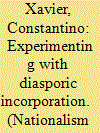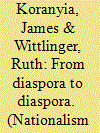| Srl | Item |
| 1 |
ID:
104046


|
|
|
| 2 |
ID:
104048


|
|
|
|
|
| Publication |
2011.
|
| Summary/Abstract |
In response to economic needs after the 1991 reforms, India instituted a diaspora policy that extracted emigrants' material wealth in exchange for cultural capital. Increasingly caught between mounting diasporic demands for the extension of dual citizenship and domestic apprehensions hostile to such a provision, the Indian government was forced to compromise by creating the Overseas Citizenship of India. This article argues that, beyond mere contingency and dependence on the existing repertoire of national membership, this novel form of limited citizenship is also the result of a deliberate governmental strategy to assuage more activist segments of the diaspora.
|
|
|
|
|
|
|
|
|
|
|
|
|
|
|
|
| 3 |
ID:
104052


|
|
|
|
|
| Publication |
2011.
|
| Summary/Abstract |
This article investigates the relationship between Transylvanian Saxons (Siebenbürger Sachsen) and their perceived "external homeland." The authors consider the history of German minorities in East-Central Europe and, more specifically, briefly outline the history of Transylvanian Saxons. Against this backdrop, this article examines the changing nature of minority policies promoted by the Federal Republic of Germany (FRG) until the present day, whilst juxtaposing this with Transylvanian Saxon discourses on identity and nationhood. In so doing, this article argues that the discrepancy between the mutual expectations of the FRG and Transylvanian Saxon émigrés became very pronounced after 1989. This then has led to what appears to be the end of the Saxon community, as émigrés have found themselves torn between assimilation and a longing for a return to Transylvania.
|
|
|
|
|
|
|
|
|
|
|
|
|
|
|
|
| 4 |
ID:
104047


|
|
|
|
|
| Publication |
2011.
|
| Summary/Abstract |
This article provides a historical analysis of the relationship between a "historical" diaspora-the Greek diaspora-and its irredentist homeland. In particular, it examines the diaspora policies the modern Greek nation-state adopted since having carried out, at least in its major part, the mission of its territorial unification-namely since 1922. It situates Greece within a broader set of irredentist cases that were involved in the movements for national unity. Moreover, it argues that what makes Greece a particularly interesting case is the attachment of its contemporary diaspora politics to the 19th century's Romantic versions of nationalism.
|
|
|
|
|
|
|
|
|
|
|
|
|
|
|
|
| 5 |
ID:
104050


|
|
|
|
|
| Publication |
2011.
|
| Summary/Abstract |
This article considers the interrelationship between a homeland and its diasporic communities from the point of view of the homeland. In particular, it examines the policies adopted by Russia and Israel toward the same group; that is, the Russian-speaking Jews who have immigrated to Israel from the former Soviet Union. The article demonstrates how the construction of this migrant population as diasporic community of the "homeland" gives rise to unexpected challenges to the symbolic definition of the "nation." These challenges add a new perspective in this regard, rendering tenuous the claim of the nation to primordiality, constancy, and coherence.
|
|
|
|
|
|
|
|
|
|
|
|
|
|
|
|
| 6 |
ID:
104049


|
|
|
|
|
| Publication |
2011.
|
| Summary/Abstract |
Russia's attitudes toward millions of Russophones in the Newly Independent states (NIS) have been noted, since 1991, for their ambivalence. The concept of a "Russian diaspora" has been pursued as an ethno-selective ideological project. On the practical-political level, however, Russian authorities were obliged to rest upon a loose notion of "compatriots." In this article, "virtual diasporization" is juxtaposed with Russophones' identities and behavior to substantiate the point that these populations do not possess the "diasporic" features ascribed to them. Moreover, official Russian policies have failed to evoke any "diasporic" sentiment within Russophones toward their putative "homeland." I argue that, to be more realistic and responsive, these policies should be more sensitive to commonalities and zones of common interest between Russophones and the titular populations of the NIS.
|
|
|
|
|
|
|
|
|
|
|
|
|
|
|
|